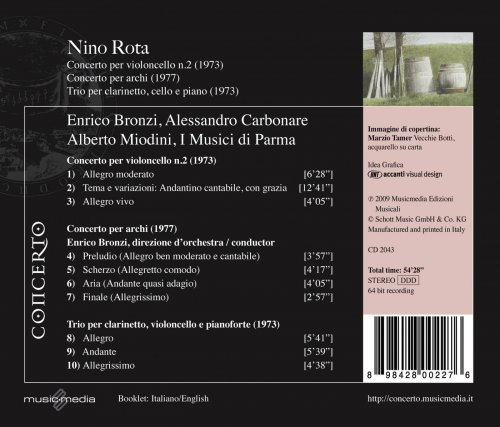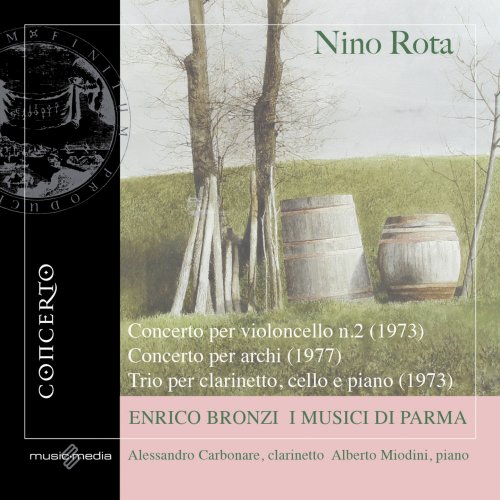
Enrico Bronzi, Alessandro Carbonare, Alberto Miodini, Orchestra da Camera "I Musici di Parma" - Nino Rota: Concerto per archi e violoncello (2009)
BAND/ARTIST: Enrico Bronzi, Alessandro Carbonare, Alberto Miodini, Orchestra da Camera "I Musici di Parma"
- Title: Nino Rota: Concerto per archi e violoncello
- Year Of Release: 2009
- Label: Concerto Classics
- Genre: Classical
- Quality: flac lossless (tracks)
- Total Time: 00:54:28
- Total Size: 250 mb
- WebSite: Album Preview
Tracklist
01. Concerto per Violoncello No. 2: I. Allegro moderato
02. Concerto per Violoncello No. 2: II. Tema e variazioni: Andantino cantabile, con grazia
03. Concerto per Violoncello No. 2: III. Allegro vivo
04. Concerto per archi: I. Preludio (Allegro ben moderato e cantabile)
05. Concerto per archi: II. Scherzo (Allegretto comodo)
06. Concerto per archi: III. Aria (Andante quasi adagio)
07. Concerto per archi: IV. Finale (Allegrissimo)
08. Trio per clarinetto, violoncello e pianoforte: I. Allegro
09. Trio per clarinetto, violoncello e pianoforte: II. Andante
10. Trio per clarinetto, violoncello e pianoforte: III. Allegrissimo

Nino Rota (1911-79) is best known for his many film scores. That doesn't mean that he couldn't write great music for other purposes, as this highly interesting program demonstrates. His idiom is conservative harmonically but highly imaginative, full of melody and mood.
All three of these pieces have been recorded before. If you don't have them yet, these performances are done with conviction. Bronzi is a good conductor as well as a fine cellist; and his reading of the Concerto for Strings is intense and well balanced, making the Parma orchestra sound quite brilliant. I would like to hear them again, despite the fact that some of the competition is conducted by Riccardo Muti. The Cello Concerto has been recorded by Dmitri Yablonsky, also a conductor (Chandos 9892, Nov/Dec 2001), while the Clarinet Trio is on a disc of Rota's chamber music played by an ensemble named after him (Chandos 9832, Nov/Dec 2000). Chandos has given us the largest collection of Rota we have. -- American Record Guide, David W Moore, November-December 2009
Parma is known for its hams, I do believe, but henceforth it also should be known for its Rota performances. This is a thoroughly enjoyable CD--just the thing for recalcitrant types who say they don't like modern classical music, or even (gasp!) classical music in general. As I write this, it is July, but when you read it, the end of the year will be approaching. If you need stocking-stuffers, consider this CD.
The Cello Concerto and the Trio date from 1973, and the Concerto for Strings from 1964-65, although it was revised in 1977, so these are fully mature works, unlike the two symphonies whose new recording I review elsewhere. The symphonies are likeable, but neither consistent in their inspiration nor truly characteristic of the composer. The three works presented here, without sounding like film music in search of a film, remind one of Rota's work with director Federico Fellini. They are by turns ironic, melancholy, and uncomplicatedly sunny, and they are always melodic. Could someone other than an Italian have composed them?
Bronzi's booklet notes are inadequate, however--at least in their English translation. Nowhere does he mention, for example, that the Cello Concerto opens with a motif taken from Mozart's Violin Concerto No. 3. Fortunately, his playing and his overall attitude toward Rota's music pick up the slack. Comparing Bronzi's recording of the Cello Concerto to one on Chandos 9892 with cellist Dmitry Yablonsky and Daniel Boico conducting I Virtuosi Italiani, one immediately appreciates Bronzi's lighter touch and more transparent textures. At times Yablonsky's cello is almost submerged in the orchestra. Bronzi's is front and center (not unduly so), but it isn't simply a question of volume and balance. Bronzi is simply more personable than Yablonsky (and Boico), and the difference between the two isn't even minor.
I Musici's recording of the Concerto for Strings (Philips 416 356) displays the older ensemble's more refined sound, and for some, that will be enough to tip the balance in its favor. The I Musici di Parma players are a little raw, particularly when they get excited. Still, there's a lot of character here, and passion too, and I am willing to accept tonal roughness if it comes with so much personality, even joy.
The Clarinet Trio has been recorded several times, although it was new to me. It is no less worthwhile than the other two works, and indeed, deserves to be a staple of this genre as much as the (surely very different) trios by Mozart and Brahms. Carbonare's tone is distinctive, and Miodini grounds the ensemble with his own brand of neo-Classical wit.
01. Concerto per Violoncello No. 2: I. Allegro moderato
02. Concerto per Violoncello No. 2: II. Tema e variazioni: Andantino cantabile, con grazia
03. Concerto per Violoncello No. 2: III. Allegro vivo
04. Concerto per archi: I. Preludio (Allegro ben moderato e cantabile)
05. Concerto per archi: II. Scherzo (Allegretto comodo)
06. Concerto per archi: III. Aria (Andante quasi adagio)
07. Concerto per archi: IV. Finale (Allegrissimo)
08. Trio per clarinetto, violoncello e pianoforte: I. Allegro
09. Trio per clarinetto, violoncello e pianoforte: II. Andante
10. Trio per clarinetto, violoncello e pianoforte: III. Allegrissimo

Nino Rota (1911-79) is best known for his many film scores. That doesn't mean that he couldn't write great music for other purposes, as this highly interesting program demonstrates. His idiom is conservative harmonically but highly imaginative, full of melody and mood.
All three of these pieces have been recorded before. If you don't have them yet, these performances are done with conviction. Bronzi is a good conductor as well as a fine cellist; and his reading of the Concerto for Strings is intense and well balanced, making the Parma orchestra sound quite brilliant. I would like to hear them again, despite the fact that some of the competition is conducted by Riccardo Muti. The Cello Concerto has been recorded by Dmitri Yablonsky, also a conductor (Chandos 9892, Nov/Dec 2001), while the Clarinet Trio is on a disc of Rota's chamber music played by an ensemble named after him (Chandos 9832, Nov/Dec 2000). Chandos has given us the largest collection of Rota we have. -- American Record Guide, David W Moore, November-December 2009
Parma is known for its hams, I do believe, but henceforth it also should be known for its Rota performances. This is a thoroughly enjoyable CD--just the thing for recalcitrant types who say they don't like modern classical music, or even (gasp!) classical music in general. As I write this, it is July, but when you read it, the end of the year will be approaching. If you need stocking-stuffers, consider this CD.
The Cello Concerto and the Trio date from 1973, and the Concerto for Strings from 1964-65, although it was revised in 1977, so these are fully mature works, unlike the two symphonies whose new recording I review elsewhere. The symphonies are likeable, but neither consistent in their inspiration nor truly characteristic of the composer. The three works presented here, without sounding like film music in search of a film, remind one of Rota's work with director Federico Fellini. They are by turns ironic, melancholy, and uncomplicatedly sunny, and they are always melodic. Could someone other than an Italian have composed them?
Bronzi's booklet notes are inadequate, however--at least in their English translation. Nowhere does he mention, for example, that the Cello Concerto opens with a motif taken from Mozart's Violin Concerto No. 3. Fortunately, his playing and his overall attitude toward Rota's music pick up the slack. Comparing Bronzi's recording of the Cello Concerto to one on Chandos 9892 with cellist Dmitry Yablonsky and Daniel Boico conducting I Virtuosi Italiani, one immediately appreciates Bronzi's lighter touch and more transparent textures. At times Yablonsky's cello is almost submerged in the orchestra. Bronzi's is front and center (not unduly so), but it isn't simply a question of volume and balance. Bronzi is simply more personable than Yablonsky (and Boico), and the difference between the two isn't even minor.
I Musici's recording of the Concerto for Strings (Philips 416 356) displays the older ensemble's more refined sound, and for some, that will be enough to tip the balance in its favor. The I Musici di Parma players are a little raw, particularly when they get excited. Still, there's a lot of character here, and passion too, and I am willing to accept tonal roughness if it comes with so much personality, even joy.
The Clarinet Trio has been recorded several times, although it was new to me. It is no less worthwhile than the other two works, and indeed, deserves to be a staple of this genre as much as the (surely very different) trios by Mozart and Brahms. Carbonare's tone is distinctive, and Miodini grounds the ensemble with his own brand of neo-Classical wit.
As a ISRA.CLOUD's PREMIUM member you will have the following benefits:
- Unlimited high speed downloads
- Download directly without waiting time
- Unlimited parallel downloads
- Support for download accelerators
- No advertising
- Resume broken downloads


